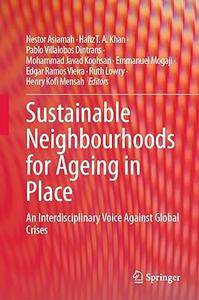
Free Download Sustainable Neighbourhoods for Ageing in Place: An Interdisciplinary Voice Against Global Crises
by Nestor Asiamah, Hafiz T.A. Khan
English | 2023 | ISBN: 3031415930 | 246 Pages | True PDF | 9.9 MB
This timely book provides an understanding of how an ageing population can maintain health in the ageing process in their preferred homes and neighbourhoods while coping with global crises of climate change events, infectious diseases, systemic violence, and radical or extreme industrialisation. It is the first-known volume to consider the four crises as health and social threats to healthy longevity from a sustainability perspective.
The book is a collection of commentaries, theoretical frameworks, case studies, and empirical evidence that: (1) provides an analysis of how the crises affect neighbourhood attributes and the ability of residents to use them to maintain health while living in their preferred neighbourhoods, and (2) suggests potential interventions for enabling residents to utilise these attributes for health while living at home in contexts experiencing the crises. Contributions are authored by scholars and practitioners from various disciplines including public health, health care, architecture, engineering, human resources development, information technology, and finance. Among the topics covered:
The Impact of Crises on Older Adults' Health and Function: An Intergenerational Perspective
A Behavioural Approach to Sustainable Neighbourhoods: A Philosophical Construction of a Friendly Neighbourhood
Assistive Technologies for Ageing in Place: A Theoretical Proposition of Human Development Postulates
"Sustainable Ageing" in a World of Crises
Sustainable Neighbourhoods for Ageing in Place: An Interdisciplinary Voice Against Global Crises serves as both a primary and secondary text particularly suited for post-graduate level study (e.g., MSc, PhD). Each chapter richly describes events, phenomena and models in a way that fits contemporary curricula for students and instructors in sociology, gerontology, architecture, environmental science studies, sustainability, ageing studies, and public health. Researchers in a broad range of disciplines can use the book as a research guide to design their studies based on models and insights described in its contents. With theoretical frameworks and recommendations from this book, stakeholders can understand what a sustainable neighbourhood is in the context of crises by presenting problems and solutions from different countries and disciplines.
